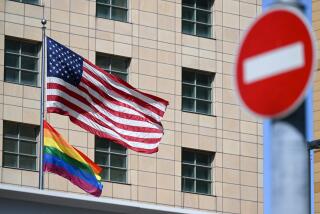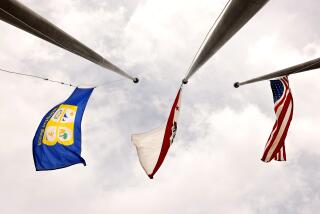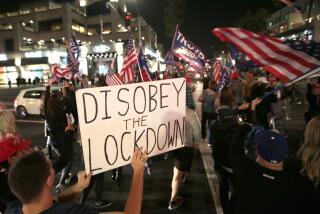Will gays march in Boston St. Patrick’s Day Parade after all?
In Arizona, corporate presure might have helped persuade Gov. Jan Brewer this week to veto legislation derided as anti-gay.
Now in Boston, this weekend, political pressure appears to be reopening a door for gays to one of the major events in the city, the St. Patrick’s Day Parade.
Gay rights groups haven’t been invited to march in the annual parade in South Boston since 1993, and the U.S. Supreme Court has affirmed the right of organizers to keep openly gay marchers out.
But new Boston Mayor Martin Walsh said this week that he would boycott the March 16 parade, in keeping with the tradition of his predecessor. However, Walsh said he would try to find a way to get a gay rights group into the parade line-up.
On Saturday, his office, a gay rights group and a parade organizer said there had been progress, though no final agreement.
Parade organizer Phil Wuschke Jr. told the Los Angeles Times that MassEquality is invited to join the 150 other groups in the three-hour parade as long as they agree to the code of conduct.
“They are going to be marching with a ‘Happy St. Patrick’s Day’ sign. That’s it,” Wuschke said. “It’s a day of celebration, not demonstration. We’re there to send a message about St. Patrick’s Day and Evacuation Day, and if they choose to abide by that, they are welcome.”
The mayor’s office said that Walsh and U.S. Rep. Stephen F. Lynch had a “positive meeting” with parade organizers on Saturday and that they “remain optimistic that a solution can be reached that will work for all parties involved.”
MassEquality characterized the conversation as ongoing.
“MassEquality has not accepted any invitation to march, and will only consider accepting an invitation that allows LGBT people to march openly,” Executive Director Kara Coredini said in a statement.
“LGBT people should not have to silence who they are to celebrate other parts of their identities,” she stated, citing conversations with Irish and military veterans who are gay and agree.
Earlier Saturday the Associated Press reported that Coredini said a tentative agreement would allow a group of gay military veterans to participate in the parade as long as they don’t display any signs or wear clothing that mention sexual orientation issues. For example, the rainbow flag wouldn’t be allowed.
Later, she said that the tentative agreement had been discussed by the mayor’s office and parade organizers, and that her group had not signed off on it. “We welcome a direct conversation with the parade organizers about making the St. Patrick’s Day Parade truly welcoming to LGBT people,” Coredini said in the statement.
Mayor Walsh would accompany the group if it marches, Wuschke said. He added that gays are free to demonstrate in their own parades.
“They have a day for that, which is non-inclusive and doesn’t allow pro-life groups and Catholic organizations,” he said. “We’ve always been inclusive.”
He said all 150 groups marching, including police from Iowa, bands from Florida, firefighters from California and military from all over, have agreed to the code of conduct.
In major cities around the world, and in many smaller ones, St. Patrick’s Day is a celebration of Irish culture and social power. Yet in recent years, it has also been the arena for protest over whether gays should be allowed to participate in parades as a clearly identified group.
The message from the Boston mayor, whose support from the gay community helped him win office last year, was the equality should come first, especially in 2014. Walsh marched in last year’s parade as a state representative.
“I certainly hope we’re able to come to an understanding,” he had said earlier this week. “It’s long overdue.”
The Supreme Court ruled unanimously in 1995 that the South Boston Allied War Veterans Council, the private sponsors of Boston’s St. Patrick’s Day parade, had a constitutional right to exclude marchers whose message they rejected. Justice David H. Souter said in his opinion that a parade was a form of expression with which the government may not interfere, even for the “enlightened” purpose of preventing discrimination.
New York City Mayor Bill de Blasio also said he wouldn’t join in his city’s St. Patrick’s Day Parade because it banned gay groups, marking the first time a New York mayor would skip out.
In New York, the St. Patrick’s Day Parade, which bills itself as the oldest civilian parade in the world, dating from the 18th century, is an almost sacred tradition, closely tied to the political power of the Irish immigrants who helped reshape the city through the 19th century. It has always been closely tied to Christian churches, especially Catholic.
The Catholic Church has long opposed same-sex marriage, but recent polls show that is easing among parishioners. Politically, gays have gained significant victories on same-sex marriage and other fronts, and have become a politically influential by turning out votes and raising campaign dollars in many places, including New York. That has made it politically safer for politicians to skip the parade, citing the exclusion of gay groups.
Follow LATimes National on Facebook
ALSO:
‘Extensive cracking’ shuts Texas high school’s $60-million stadium
Tony Alamo victims awarded $525 million; L.A. properties may be sold
Texas gay marriage: Two friends who took opposite sides in the courtroom
More to Read
Start your day right
Sign up for Essential California for news, features and recommendations from the L.A. Times and beyond in your inbox six days a week.
You may occasionally receive promotional content from the Los Angeles Times.







